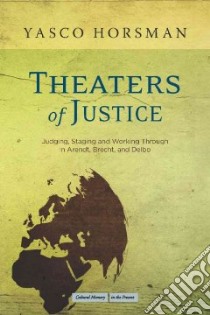Theaters of Justice - 9780804770323
Un libro in lingua di Yasco Horsman edito da Stanford Univ Pr, 2010
- € 20.60
- Il prezzo è variabile in funzione del cambio della valuta d’origine
"Theaters of Justice is an important and highly readable in-depth study of post-war legal and literary events that continue to exert their influence on the contemporary understanding of justice and historical truth."---Ulrich Baer, New York University
This book intervenes in the debate about the role of legal trials in collective Processes of coming to terms with a history of mass violence. Through an analysis of philosophical and literary texts, Theaters of Justice raises the question of how the theatrical structure of a criminal trial both facilitate and limits national processes of healing and learning from the past. The book begins with the widely publicized, historic trials of three Nazi war criminals, Eichmann (1961), Barbie (1987), and Priebke (1998), which differed from the international tribunals in Nuremberg and Tokyo in that their explicit goal was not only to mete out punishment, but also to establish an officially sanctioned version of the past. In the 1980s and 1990s, the Truth and Reconciliation Commissions established in South America and South Africa added a therapeutic goal to these political and didactic aims, acting on the belief that a trial can help bring about a moment of closure.
Theaters of Justice challenges this belief that a trial should provide closure through a reading of texts that offer profound reflections on the relations among pedagogy, therapy, and legal trials: Etchmann in Jerusalem (1963) by the political philosopher Hannah Arendt; Days and Memory (1985) and Auschwitz and After (1965-72) by Auschwitz survivor and poet Charlotte Delbo; and one of the so-called Lehrstucke of Bertolt Brecht, The Measures Taken (1930). Horsman argues that these widely divergent texts are responses to historic legal trials that effectively reopen the cases that the historic trials sought to close, bringing to center stage issues that had escaped the confines of their legal frameworks.
Informazioni bibliografiche
- Titolo del Libro in lingua: Theaters of Justice
- Sottotitolo: Judging, Staging, and Working Through in Arendt, Brecht, and Delbo
- Lingua: English
- Autore: Yasco Horsman
- Editore: Stanford Univ Pr
- Collana: Stanford Univ Pr (Paperback)
- Data di Pubblicazione: 06 Dicembre '10
- Genere: LITERARY CRITICISM
- Argomenti : Holocaust, Jewish (1939-1945), in literature Trials in literature Justice in literature
- Pagine: 217
- ISBN-10: 0804770328
- EAN-13: 9780804770323


